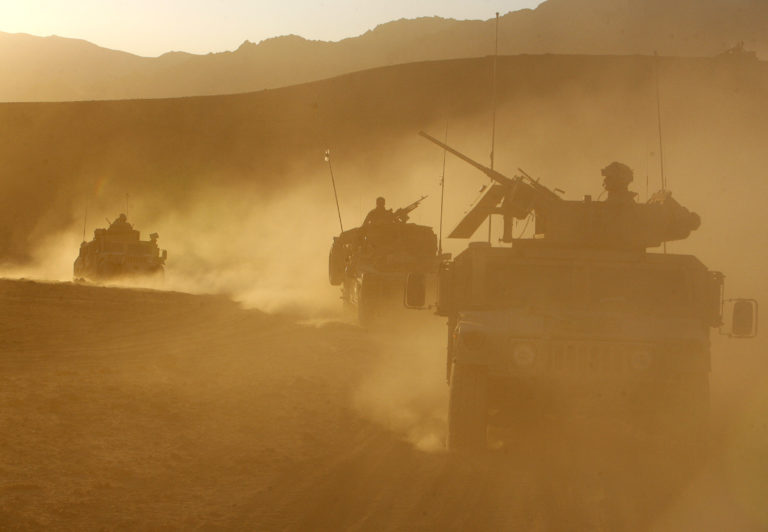In a Winter 2001 editorial, MERIP editors Chris Toensing and Elliott Colla insisted, “The hijackings and mass murders of September 11 were horrible and momentous, but the world did not suddenly change on that crystal-clear morning.” MERIP presciently argued that the horrific spectacle of the world’s richest country bombing Afghanistan—one of the poorest—could not obscure the ultimate futility of Washington’s imperial endeavors in that country and elsewhere.

US and Dutch soldiers drive along a dusty road in a village in Baluchi pass in Uruzgan province, Afghanistan, November 2007. Goran Tomasevic/Reuters
MERIP’s coverage of the resulting Global War on Terror counters the willful amnesia of American nationalism with a rigorous insistence on illuminating the historical continuities of imperial violence. Legendary anticolonial thinker Eqbal Ahmad paved the way when Middle East Report published his essay “Comprehending Terror” in 1986. It lays out ideas that would inform his 1998 polemic, “Terrorism: Theirs and Ours,” delivered shortly before his passing and widely circulated following the events of September 11. Ahmad, a longtime friend and supporter of MERIP, helped shape enduring left critiques of the “terrorism” label: its propensity to shut down reasoned inquiry, its incitement of selective moral outrage and obfuscation of far more consequential forms of state violence.
Over the past two decades, MERIP has closely followed the metastasizing violence of the War on Terror. The magisterial overviews provided in Chris Toensing’s editors notes remain valuable surveys of their respective historical moments. Other highlights include Laleh Khalili’s germinal writings on counterinsurgency and drone warfare (prefiguring her landmark volume Time in the Shadows); Steve Niva’s coverage of the evolution of US Special Operations Forces and their manhunting networks that have become “increasingly autonomous and machine-like;” Rochelle Davis on the weaponization of culture and Lisa Hajjar’s indefatigable coverage of US extraterritorial torture and detention practices, especially at Guantánamo Bay, Cuba and Bagram, Afghanistan. MERIP also paid close attention to the tense complicities linking the United States and its client states, such as Egypt and Pakistan. Scott Cutler Shershow and Scott Michaelsen’s 2004 essay on “The Guantánamo Black Hole” sketched some theoretical parameters around sovereignty and legal exception that would become a staple of left commentary in the post-September 11 era.
At the same time, MERIP’s War on Terror coverage remains true to the publication’s roots in political economy. Standouts here include Khalid Mustafa Medani’s careful tracing of much-maligned hawala money transfer networks between East Africa and the Gulf and Ian Urbina’s exposé of the role of prison labor in the US military industrial complex. These works paved the way for my own study of Washington’s reliance on—and abuse of—the migrant labor force propping up its military presence in the region.
Thanks to its attention to the politics of contestation, MERIP has also featured unusually thoughtful coverage of the jihad formations that would attract so much notoriety, as well as superficial mainstream coverage. Hisham Mubarak’s 1996 conversation with a leader in the Egyptian Gama’a Islamiyya, who was later kidnapped by the CIA, remains an important primary source for understanding the transnational jihad scene in those years. More recently, Andy Clarno’s interview with “Mosul Eye” blogger Omar Mohammed provides a clear-eyed account of life in Mosul under the self-declared Islamic State.
In MERIP’s first issue following the September 11 attacks, Salwa Ismail and Khaled Abou El Fadl provided astute commentary for grounding political analysis of Islamist movements in relation to doctrinal traditions. And readers would be remiss to neglect Charles Hirschkind’s 1997 “What is Political Islam?” Continuing in this tradition, my 2011 article on the Arab “foreign fighters” who took part in the jihad in Afghanistan attempted to provide an overview of this diverse transregional movement and its mixed legacies—of which al-Qaeda was only one.
-768x1001.jpg)
Middle East Report no. 255, Summer 2010. Cover design by Jimmy Bishara.
Finally, MERIP has been active in debates over the politics of representation, especially with a keen grounding in material realities. MERIP has delivered incisive critiques of the War on Terror’s effects in popular culture, from Jamil Khader’s analysis of Ramadan television series to the recent dissection of a sitcom about a US soldier and his Afghan interpreter by Wazhmah Osman, Helena Zeweri and Seelai Karzai. Hisham Aïdi examined how the War on Terror inflected discourses around racialization in ways that prefigure contemporary debates. Lara Deeb and Jessica Winegar charted how these events shaped an entire generation of anthropologists of the Middle East in the US academy. There were also attempts to deconstruct industries of expertise including Arbella Bet-Shlimon’s evisceration of the New York Times’ plunder of documents from Iraq, Wisam Alshaibi on the Bush Administration’s exploitation of Iraqi state archives and my own survey of the follies of “jihadism” as an analytical category, very much indebted to the Eqbal Ahmad essay mentioned above.
The issue of Middle East Report that included Ahmad’s 1986 article also featured remarks he made on the occasion of MERIP’s fifteenth anniversary. He not only praised the editorial collective’s stances but noted that “it has linked arms with the future.” For Ahmad, it was MERIP’s commitment to supporting critical pedagogy that stood out, “an inspiring continuity here of generations of activist intellect.” I and many others in the generations that followed those comments have found in MERIP an archive of insight and inspiration. The act of remembering—of forging memory in community—is ever necessary to counter the amnesia that constantly works to render imperial violence benign, that even today seeks to erase the War on Terror just as it erased the horrors that preceded and enabled it.
[Darryl Li is assistant professor of anthropology and associate member of the law school at the University of Chicago and author of The Universal Enemy: Jihad, Empire, and the Challenge of Solidarity. He was an editor of Middle East Report from 2011 to 2016.]
